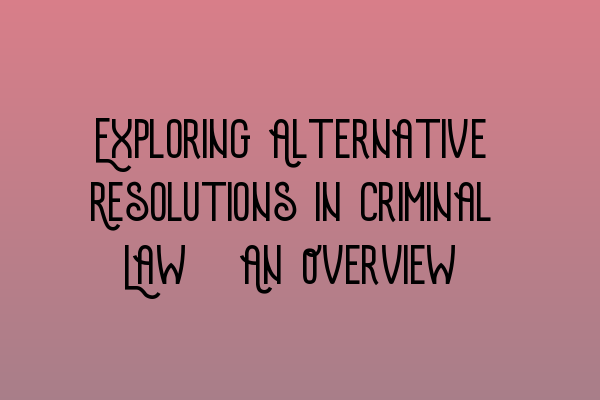Exploring Alternative Resolutions in Criminal Law: An Overview
In the field of criminal law, the focus has traditionally been on determining guilt or innocence and imposing punishment accordingly. However, there is an increasing recognition that alternative resolutions can offer a more efficient and effective approach to criminal justice.
Alternative resolutions refer to methods other than traditional trials that can be used to resolve criminal charges. These alternatives prioritize problem-solving, rehabilitation, and community involvement rather than solely punitive measures.
The Benefits of Alternative Resolutions
There are several benefits to exploring alternative resolutions in criminal law:
- Efficiency: Traditional trials can be time-consuming and expensive. Alternative resolutions, such as diversion programs or restorative justice practices, can reduce the burden on the criminal justice system.
- Rehabilitation: Alternative resolutions often focus on addressing the underlying issues that contribute to criminal behavior. By providing support and resources, these resolutions aim to rehabilitate offenders and reduce the likelihood of reoffending.
- Victim Satisfaction: Restorative justice practices give victims a voice and an opportunity to participate in the resolution process. This can lead to greater satisfaction for victims and a sense of closure.
- Community Engagement: Alternative resolutions often involve communities in the resolution process. This can foster a sense of responsibility and accountability among community members, leading to safer and more supportive communities.
Types of Alternative Resolutions
There are various types of alternative resolutions that can be implemented in criminal law:
- Diversion Programs: Diversion programs offer individuals an alternative to traditional prosecution. These programs typically involve counseling, education, or community service in exchange for a dismissal or reduction of charges.
- Restorative Justice: Restorative justice practices aim to repair the harm caused by the offense. This is achieved through victim-offender mediation, where affected parties engage in dialogue to address the impact of the crime and determine appropriate resolutions.
- Problem-Solving Courts: Problem-solving courts, such as drug courts or mental health courts, address underlying issues that contribute to criminal behavior. These courts provide specialized treatment and support services to offenders, with the goal of reducing recidivism rates.
Considerations for Implementing Alternative Resolutions
While alternative resolutions offer many advantages, their implementation requires careful consideration of various factors:
- Legal Framework: Alternative resolutions may require changes to existing laws and regulations to ensure their legality and enforceability.
- Resources: Implementing alternative resolutions effectively requires adequate resources, including funding, personnel, and community support.
- Evaluation and Monitoring: Ongoing evaluation and monitoring are essential to assess the effectiveness of alternative resolutions and make necessary adjustments.
Exploring alternative resolutions in criminal law is a progressive step towards a more balanced and humane justice system. By focusing on problem-solving, rehabilitation, and community engagement, alternative resolutions can lead to better outcomes for all parties involved.
If you are interested in learning more about criminal law or preparing for the SQE exams, check out these related articles:
- SQE 1 Practice Exam Questions
- SQE 1 Practice Mocks FLK1 FLK2
- SQE 2 Preparation Courses
- SQE 1 Preparation Courses
- SRA SQE Exam Dates
